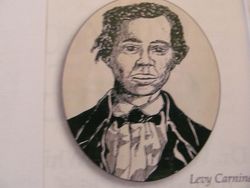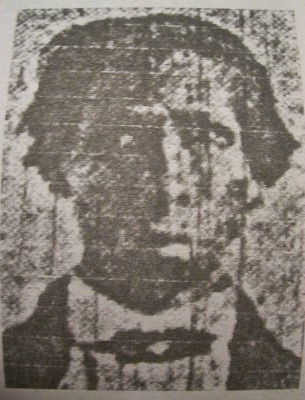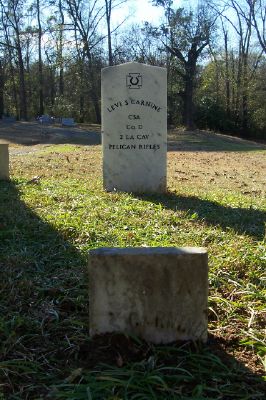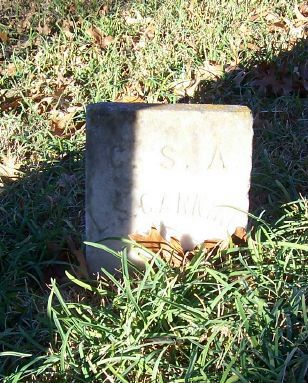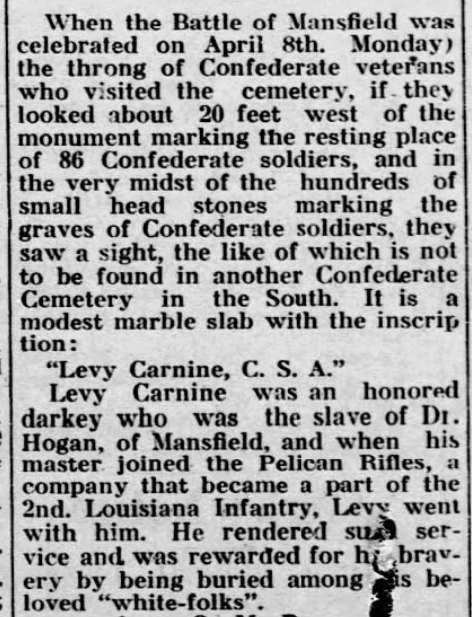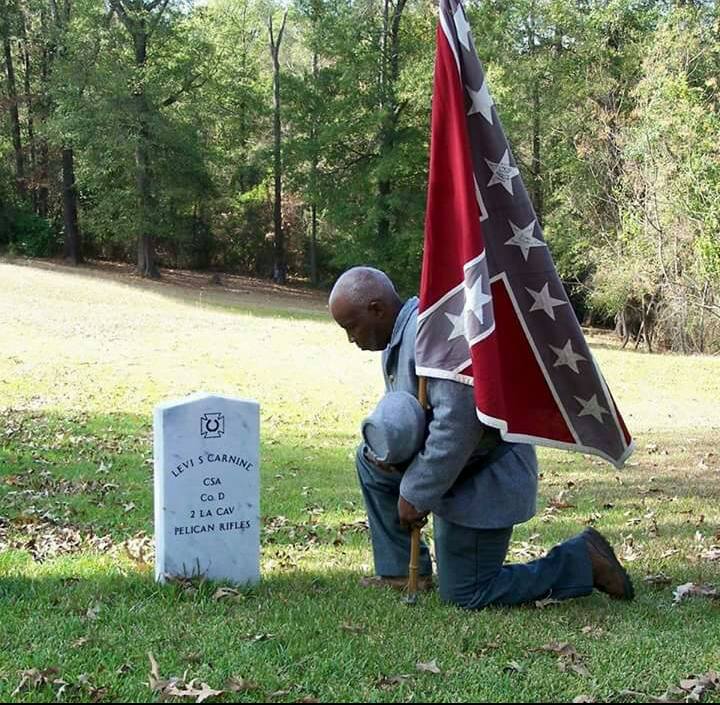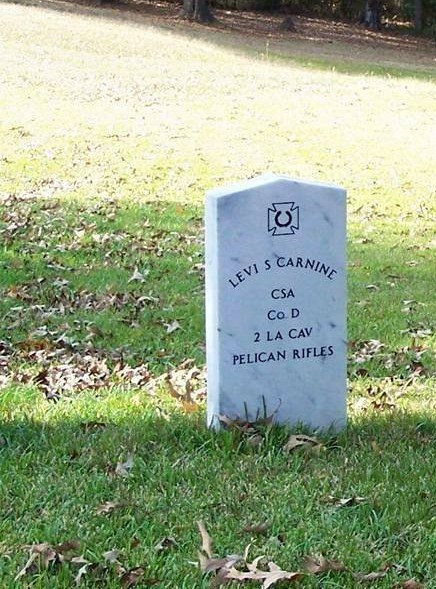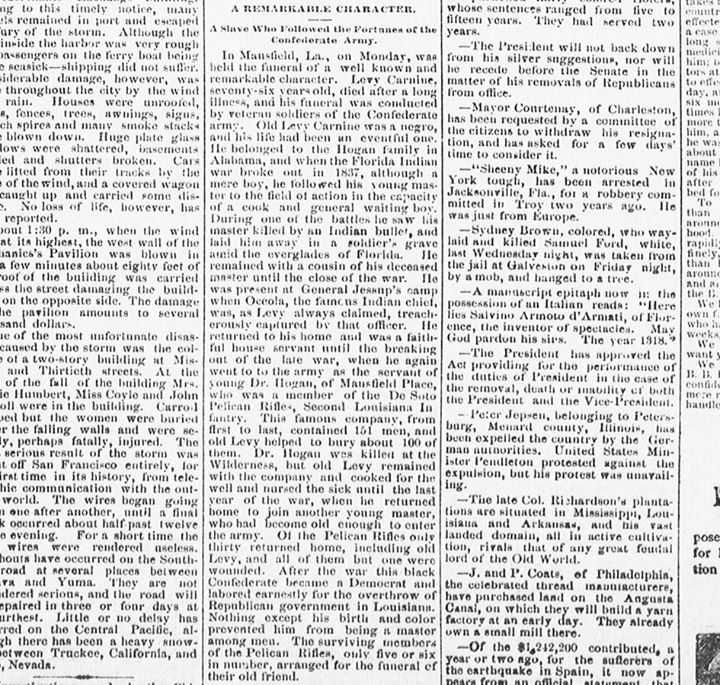Levy Carnine was a slave belonging to a young Mansfield physician named Hogan. Dr. Hogan volunteered for service in the Pelican Rifles, the first infantry company to leave DeSoto Parish for the Confederate army.
when Dr. Hogan went to war, Levy went with him, serving as Hogan's valet and cook. And when Hogan was mortally wounded in Virginia, it was Levy who carried him to the hospital, nursed him and cared for him. But Dr. Hogan died and it was Levy, his faithful servant and friend, who dug his grave, buried his body, found a minister to perform the burial service and even carved a gravestone.
Not knowing where to turn next, Levy returned to Hogan's regiment and reported to Capt. Jesse Williams, Hogan's old friend from Mansfield who had helped to organize the company.
Williams, who had just become colonel of the regiment, told Levy to stay with him until he could arrange safe transportation for him back to DeSoto Parish. As the war raged on, however, this became impossible and Levy stayed with Williams performing the same tasks he had done for Hogan. Soon Williams was promoted to brigadier general, but not long thereafter, he, too, was killed in battle. Once again, Levy Carnine buried an old friend.
After Williams' death, Levy decided to stay with company. First he took of company cook, preparing the mess for the whole lot. As more and more of their number fell wounded or killed, however, Levy began to take up arms as well, going into battle with his comrades from DeSoto Parish. How shocking it must have been for the Union soldiers to see a black face among the charging Confederates in so many bloody conflicts!
He served with the 2nd Louisiana Volunteer Regiment, Pelican Rifles. He traveled behind Yankee lines to take messages from Desoto Parish soldiers back to Desoto Parish.
After the war he served as Pelican Rifles Historian
He was a member of United Confederate Veterans
He was buried in the Confederate section of Mansfield Cemetery, Mansfield, Desoto Parish, Louisiana by his comrades-in-arms.
At the time of his death in 1924, the Confederate Veteran Magazine, the monthly journal of the United Confederate Veterans organization, praised Levy Carnine, calling him "a hero of the War Between the States." No small praise for a black man in those days.
He is one of the only black people buried in the cemetery, his brother veterans insisted he be buried there because of his devotion and courageous service to his country and State.
~~~~~~~~~~~~~~~~~~~~~~~~~~~~~~~~~~~~
∼Saturday, January 23, 1886 Fredericksburg (Virginia) Star newspaper obituary
"Levy Carnine, an old colored man, was buried by the Confederate veterans in Mansfield, La., on Sunday. He was a body servant during the Indian war of 1836, and went faithfully through the late war with the DeSoto, La. Pelican Rifles. After his master was killed he continued to serve his company until the war was over. After the war he became an active Democrat and worked hard to overthrow Radicalism in Louisiana. The veterans of the Pelican Rifles attended his funeral in a body. Peace to his ashes."
Levi's wife, Frances, is shown as being a widow on the 1900 census in Mansfield. She is living in enumeration district 54, sheet 2B, line 57. The 1870 census has Levi as being born in 1813 in Kentucky. The 1880 census has him being born in 1820 in Maryland. Levi and Frances had the following four daughters: Susan, Sophia, Sarah, and Phillis. Susan, Sarah, and Phillis are on the 1900 census, living with their mother. This census shows their father, Levi, born in Georgia, so there are 3 possibilities for his birthplace. His daughter, Sarah, married Matthew Brown. Daughter, Susan, married a Tucker.
Levy Carnine was a slave belonging to a young Mansfield physician named Hogan. Dr. Hogan volunteered for service in the Pelican Rifles, the first infantry company to leave DeSoto Parish for the Confederate army.
when Dr. Hogan went to war, Levy went with him, serving as Hogan's valet and cook. And when Hogan was mortally wounded in Virginia, it was Levy who carried him to the hospital, nursed him and cared for him. But Dr. Hogan died and it was Levy, his faithful servant and friend, who dug his grave, buried his body, found a minister to perform the burial service and even carved a gravestone.
Not knowing where to turn next, Levy returned to Hogan's regiment and reported to Capt. Jesse Williams, Hogan's old friend from Mansfield who had helped to organize the company.
Williams, who had just become colonel of the regiment, told Levy to stay with him until he could arrange safe transportation for him back to DeSoto Parish. As the war raged on, however, this became impossible and Levy stayed with Williams performing the same tasks he had done for Hogan. Soon Williams was promoted to brigadier general, but not long thereafter, he, too, was killed in battle. Once again, Levy Carnine buried an old friend.
After Williams' death, Levy decided to stay with company. First he took of company cook, preparing the mess for the whole lot. As more and more of their number fell wounded or killed, however, Levy began to take up arms as well, going into battle with his comrades from DeSoto Parish. How shocking it must have been for the Union soldiers to see a black face among the charging Confederates in so many bloody conflicts!
He served with the 2nd Louisiana Volunteer Regiment, Pelican Rifles. He traveled behind Yankee lines to take messages from Desoto Parish soldiers back to Desoto Parish.
After the war he served as Pelican Rifles Historian
He was a member of United Confederate Veterans
He was buried in the Confederate section of Mansfield Cemetery, Mansfield, Desoto Parish, Louisiana by his comrades-in-arms.
At the time of his death in 1924, the Confederate Veteran Magazine, the monthly journal of the United Confederate Veterans organization, praised Levy Carnine, calling him "a hero of the War Between the States." No small praise for a black man in those days.
He is one of the only black people buried in the cemetery, his brother veterans insisted he be buried there because of his devotion and courageous service to his country and State.
~~~~~~~~~~~~~~~~~~~~~~~~~~~~~~~~~~~~
∼Saturday, January 23, 1886 Fredericksburg (Virginia) Star newspaper obituary
"Levy Carnine, an old colored man, was buried by the Confederate veterans in Mansfield, La., on Sunday. He was a body servant during the Indian war of 1836, and went faithfully through the late war with the DeSoto, La. Pelican Rifles. After his master was killed he continued to serve his company until the war was over. After the war he became an active Democrat and worked hard to overthrow Radicalism in Louisiana. The veterans of the Pelican Rifles attended his funeral in a body. Peace to his ashes."
Levi's wife, Frances, is shown as being a widow on the 1900 census in Mansfield. She is living in enumeration district 54, sheet 2B, line 57. The 1870 census has Levi as being born in 1813 in Kentucky. The 1880 census has him being born in 1820 in Maryland. Levi and Frances had the following four daughters: Susan, Sophia, Sarah, and Phillis. Susan, Sarah, and Phillis are on the 1900 census, living with their mother. This census shows their father, Levi, born in Georgia, so there are 3 possibilities for his birthplace. His daughter, Sarah, married Matthew Brown. Daughter, Susan, married a Tucker.
Advertisement
Records on Ancestry
Sponsored by Ancestry
Advertisement
